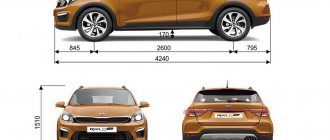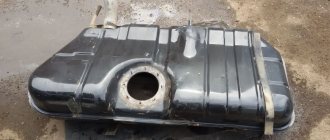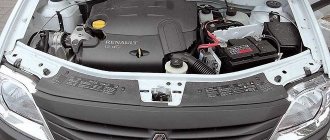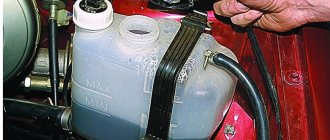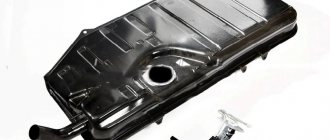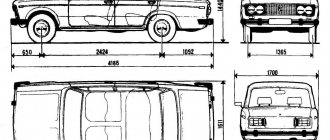For many owners of a practical Kia Rio model, such an indicator as the volume of the fuel tank is almost of paramount importance. This point is especially acute for owners who often have to travel long distances or go abroad, where, as we know, fuel is more expensive. This point is also relevant for people living in areas where gas stations are quite small. After refueling, the owner should correctly calculate his fuel supply in order to avoid the risk of stopping in a deserted area and with an empty tank. In this article we will talk about the volume of the tank on this machine.
Where is the gas tank located?
The design of the Kia Rio was carried out by the manufacturer with an eye to the requirements of the entire list of regulations and safety rules. The container is located in the safest point of the car in terms of emergency - in its rear part, close to the trunk. The container is no less than half a meter away from the rear bumper. This distance was not chosen by the manufacturer by chance and allows you to protect passengers in the event of a collision between the rear of the car and the vehicles of other road users, therefore the volume of the gas tank is selected optimally.
Kia Rio 2012 fuel filter replacement
Inside the gas tank there is a pump that serves to pump fuel through the lines into the injection system ramp. There is also an adsorber designed to capture the released fuel vapors.
All factories where the Kia Rio 2014 model year is assembled
In the current competitive environment, car manufacturing plants are trying to spread their branches around the world as much as possible in order to spend less money on taxes and duties on importing cars into countries with high turnover. Therefore, the Kia Rio is assembled at six factories located in countries with large purchasing power and developed demand for Korean cars.
This policy allows the company to receive financial benefits and make its cars more accessible to the population of large countries. Also, this trend is an impetus for the development of the economy not only of Korea, but also of other countries, therefore the practice of building factories in other countries is gaining momentum. Kia Rio assembly today takes place at the following factories:
- South Korea - one of the largest enterprises of the KIA group in the city of Gwangmyeong;
- China is a huge plant that covers the needs of the Chinese market and is located in the city of Yancheng;
- Ecuador is a plant that supplies budget sedans to all countries of South America;
- Indonesia - production for Southeast Asian countries;
- Philippines - one of the most technologically advanced new factories in Parañaque City;
- Russia - assembly is carried out at the Hyundai plant in St. Petersburg on the same branch on which the KIA Rio's brother based on the base - Hyundai Solaris (Accent) is assembled.
This geographical spread allows the Korean company to gain control over many markets in different countries. For example, a plant in Russia supplies cars to all CIS countries and some countries in Eastern Europe. Western Europe and the USA receive budget sedans exclusively made in Korea.
It is quite difficult to purchase a Korean-assembled Kia Rio in Asia or Russia. To do this, you need to import a car from Europe, spending a lot of money on paperwork and transportation. Therefore, it is better to be content with the proposed option and the domestic assembly of the Kia Rio.
What are the technical parameters of the part?
Such an important characteristic as capacity may depend on many additional aspects. And yet, how many liters is the tank in the car? Based on the passport data, we note that the maximum capacity in the Kia Rio reaches 45 liters.
In hot weather, you should refrain from filling the tank to full due to the presence of thermal expansion of the internal atmosphere. Based on the requirements of safety measures, it is necessary to calculate an amendment that allows you to determine the volume of fuel to be filled, taking into account the specified temperature aspect. How many liters of tank should be optimally filled? To ensure sufficient fluidity of the fuel and to comply with safe transportation measures, the tank should only be filled to 43 liters.
Millimeter maker
On the road, both Rios feel the same, and according to the passport data, the difference in acceleration from zero to 100 km/h for the test cars is only 0.4 seconds. Handling is also identical. But with ground clearance things are much more interesting. In order to join the ranks of pseudo-crossovers, nowadays a plastic body kit alone is not enough.
According to the passport data, the difference in ground clearance is only 10 mm in favor of the hatchback.
When meeting a curb, the differences in ground clearance are almost unnoticeable.
The phrase “raised hatchback” in the description of a car is extremely necessary - if only to write it in brochures for buyers. Formally, the Rio X-Line's ground clearance is indeed greater than that of the Rio sedan - 170 mm versus 160 mm, these are the numbers indicated by the manufacturer in the technical specifications. In practice, it is unlikely that you will be able to feel the difference, especially since the cars are almost identical in distance from the bumpers to the ground. Avtomir's measurements showed that under the front bumper of the X-Line there is 220 mm of free space (for the sedan - 210 mm), but at the rear the hatch is slightly higher - 340 mm versus 310 for the four-door.
Cost of ownership per year, rub.
| Maintenance at an official dealer* | 7 470 |
| Fuel (20,000 km) | 51 118 |
| OSAGO** | from 3 432 |
| CASCO*** | from 36 786 |
| Transport tax | 3 075 |
| Total | 101 881 |
*Prices vary by dealership** For Moscow, with minimal increasing factors***Full coverage, without deductible, based on the example of one insurance company with the maximum age and experience of the driver |
Design features of the tank
The fuel tank is made of duralumin alloy. A pair of its stamped halves are welded together. Thus, a sealed vessel is obtained, which is equipped with the following elements:
- a pipe acting as a filler neck;
- fuel filter;
- fastening tape;
- fuel supply pump to the power system;
- fuel pipe.
There is a lot of information on the Internet regarding how to dismantle the tank, including detailed instructions for step-by-step actions. Below are some recommendations for repairs.
Air filter Kia Rio 2014
Advantages of the new K5 body
The resulting fastback-style body from the side resembles a wing profile. The sloping roof improves aerodynamics without compromising tall crew members in the front seats.
Modernized lighting equipment at the front and rear and the front bumper make the car look solid and presentable, but the large design of the radiator grille and the turn signals that “flow” onto the wing are quite controversial solutions in this class.
Specifications
| Automobile | Kia K5 | |
| Modification name | 2.0 MPI | 2.5 GDI |
| Body type | four-door sedan | |
| Number of places | 5 | |
| Length, mm | 4905 | |
| Width, mm | 1860 | |
| Height, mm | 1465 | |
| Wheelbase, mm | 2850 | |
| Ground clearance (clearance), mm | 155 | |
| Curb weight, kg | ||
| engine's type | petrol, with distributed injection | petrol, direct injection |
| Location | front, transverse | front, transverse |
| Number and arrangement of cylinders | 4, in a row | 4, in a row |
| Working volume, cubic meters cm. | 1999 | 2497 |
| Number of valves | 16 | 16 |
| Maximum power, l. With. (kW)/rpm | 150 | 194 |
| Maximum torque, Nm / rpm | 192 | 246 |
| Transmission | automatic, 6-speed | automatic, 8-speed |
| Drive unit | front | |
| Tires | 215/60 R16 | 215/55 R17 |
| Maximum speed, km/h | 10,6 | 8,6 |
| Acceleration time 0-100 km/h, s | 7,2 | 7,1 |
| Fuel consumption in the combined cycle, l/100 km | ||
| Fuel tank capacity, l | ||
| Fuel type | petrol |
Video Kia K5
But the rear exterior was a success. A short overhang, a “raised” bumper, and integrated parallelograms of the exhaust pipes emphasize the sporty notes of the car.
Features of the K5 interior
Here modern trends are fully manifested. Almost half of the controls were moved to the sloping steering wheel, and another part was “hung” on the steering column switch, making them too multifunctional.
The instrument panel in basic versions is combined: analog scales + 4-inch screen, in more advanced versions it is completely virtual on a 12-inch monitor.
Photos of the Kia K5 interior
In the center of the front panel is a 10-inch touchscreen that controls a host of functions, from the navigator and on-board computer to multimedia and a Bose audio system with six speakers. Sensors for the climate control system are located just below, and on the central tunnel there is a “puck” for switching automatic transmission modes.
The salon is designed for 5 full seats. The front seats are ergonomic, with developed lateral support, optionally heating, ventilation, and electrical adjustment. Ventilation with heating is available (depending on the configuration) for the rear sofa, and multi-zone climate control will ensure a comfortable temperature anywhere in the cabin.
Disadvantages of the trunk
Relatively modest, with a volume of 510 liters, with an awkward edge. True, it can be increased to 1.5 cubic meters by reclining the divided back of the sofa, but it is unlikely that this function will be in great demand in a sedan of this class. A full-size spare wheel and a tool kit are hidden under the raised trunk floor.
Checking the fuel tank
To check the tightness of the tank in the KIA Rio, you will need to equip yourself with a compressor paired with a hose. We tightly close all the pipes and openings present in the tank. We pump air into the product, ensuring a pressure of at least 2 atmospheres. At this moment, the safety valve must relieve excess pressure.
Some manufacturers install a special valve in the plug, and sometimes they can replace it with a simple calibrated hole. Specifically in the Kia Rio, some modifications may have a design designed to relieve excess pressure not through the cap valve, but through a special fitting placed on the fuel line.
The tube has a connection with the outside atmosphere, due to which accumulated gases are safely removed.
From Alpha to Gamma
The Russian consumer was offered a sedan, and then a hatchback, with two gasoline engines. The first models were called Alpha and did not undergo changes for a long time. The Russian version of the car has improved Gamma engines. Their serial designation is G4AE. The engines have a single-row arrangement of four cylinders, each of which has 4 valves. Thanks to the designers, “Gamma” turned out to be much more successful than its predecessor. This is noticeable by the following signs:
- The timing belt is missing. Now a reliable chain drive is used instead;
- The intake valve location has been changed so that the manifolds are located at the front of the unit, which allows for better cooling, more efficient fuel delivery and increased power;
- The location of the mounted units has changed, which has reduced the occurrence of some problems;
- The engines received plastic intake manifolds. This affected the smoothness of fuel delivery and improved noise characteristics;
- The valves were left without hydraulic compensation. This change simplified maintenance.
In addition, completely new approaches were used in Gamma engines, which had a beneficial effect on technical characteristics. In particular:
- The spark plugs were positioned in a new way and began to receive more cooling, which reduced fuel consumption;
- The cooling jacket has increased, reducing the temperature of the gases at the outlet;
- The displacement of the axis between the crankshaft and the center of the cylinder reduced friction and increased engine life;
- The lightweight aluminum block has become more rigid and reliable.
It is safe to say that the third generation Kia Rio engines represent a completely new series, which is in no way comparable to the engines of the second, and especially the first generation of Korean cars. For greater confidence, you can add improved generator operation. When accelerating, it reduces its power, sparing the engine. During braking, the opposite happens. Now the generator can effectively charge the battery when idling. Due to the double thermostat in the cooling system, a faster warm-up mode for the engine is obtained.
Fuel tank repair
The process of eliminating damage (holes, cracks, etc.) that causes a leak in the tank in the KIA Rio involves the use of epoxy resins or “cold welding”. The resin is sold complete with a hardener. The surface of the tank with the repair area must first be cleaned and then degreased using anti-silicone. Due to the tendency to set quickly, the resin and hardener must be mixed before the very moment of application.
If we use “cold welding,” then it should also be kneaded well and subsequently sculpted into something similar to a flat patch.
We apply such a patch to the damaged area on the KIA Rio tank, making sure to rub its edges into the metal surface. We wait for the moment of hardening (at least an hour), after which the restored tank can be used. The “welding” substance does not react with fuel, oils and other automotive fluids.
Neck
This part is not an ordinary fuel supply pipe, as many Renault Logan users imagine. There is a plastic ventilation tube in the neck. It vents air that forces incoming gasoline into the tank during refueling, preventing fuel from escaping back out of the filler neck. The volume of air that comes out equals the amount of gasoline that goes in. The neck, tank and vent tube are a complete part, cannot be separated and are not supplied separately.
The neck of the gas tank is covered with a cap, which is a decorative element of the body. At the same time, the lid protects the neck from getting excess dust and dirt. Under the lid there is another barrier to the neck - a stopper, which is equipped with a lock. The presence of a lock under the cover is so inconvenient during refueling that many drivers of Renault cars change them immediately after purchase to those that do not have a lock. To prevent the new plug from getting lost, it has a cord that is attached to the lid.
There is an opinion that if while driving the sensor shows that gasoline is at zero, there is no need to worry, there are at least 5 liters of fuel in the tank. The fact is that Renault Logan was created precisely for those countries where the quality of the road surface is absent or leaves much to be desired. Therefore, the suspension in this car is reliable and can withstand the harshest climatic conditions, and fuel consumption does not increase while driving off-road.
Renault Logan is inexpensive to maintain and operate. Thanks to the small engine capacity (1.4 and 1.6 liters), fuel consumption is moderate. It is recommended to use unleaded fuel as fuel, the octane number of which starts from 91. To avoid confusion, you need to take another look at the gas tank cap.
To refuel Renault Logan, experts advise using 92-grade gasoline, since it contains the least amount of impurities that harm spark plugs. Although many motorists claim that when the car is running on 95 gasoline, the dynamics improve significantly.
Tank volume Kia Rio 2015, 3rd generation, hatchback, restyling, QB
The model is produced from 06.2015 to 09.2017.
| Equipment | Fuel tank volume, l | Type of fuel |
| 1.4 MT Comfort | 43 | Gasoline AI-92 |
| 1.4 MT Comfort Audio | 43 | Gasoline AI-92 |
| 1.4 MT Comfort Air conditioning | 43 | Gasoline AI-92 |
| 1.4 AT Comfort Audio | 43 | Gasoline AI-92 |
| 1.6 MT Comfort Audio | 43 | Gasoline AI-92 |
| 1.6MT Luxe | 43 | Gasoline AI-92 |
| 1.6MT Prestige | 43 | Gasoline AI-92 |
| 1.6MT UEFA | 43 | Gasoline AI-92 |
| 1.6MT Red Line | 43 | Gasoline AI-92 |
| 1.6 MT Luxe FCC 2017 | 43 | Gasoline AI-92 |
| 1.6 AT Comfort Audio | 43 | Gasoline AI-92 |
| 1.6 AT Luxe | 43 | Gasoline AI-92 |
| 1.6 AT Prestige | 43 | Gasoline AI-92 |
| 1.6 AT Premium | 43 | Gasoline AI-92 |
| 1.6AT UEFA | 43 | Gasoline AI-92 |
| 1.6 AT Premium 500 | 43 | Gasoline AI-92 |
| 1.6 AT Red Line | 43 | Gasoline AI-92 |
| 1.6 AT Premium Navi | 43 | Gasoline AI-92 |
| 1.6 AT Luxe FCC 2017 | 43 | Gasoline AI-92 |
Interior
Nissan Qashqai fuel tank capacity
The interior of the Kia Rio 2022 showroom has received more changes than the design of the Kia Rio in the new body. The car interior is provided with:
- decorative aluminum elements (accessories, door handles);
- wide choice of colors and materials;
- larger in size compared to earlier models.
The designers' goal was to create a laconic design. The panel inside the cabin is equipped with bright lighting. The radio has received a new design. Additionally, a climate control unit is installed in the cabin.
The interior equipment consists of:
- alarms;
- on-board computer;
- navigation systems;
- power steering.
The Kia Rio 2022 salon received a new feature in the form of internal heated windows and seats. The climate control system automatically regulates the thermal conditions and air quality inside the car.

